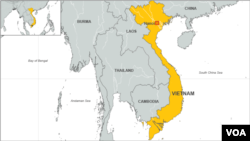China watchers are closely observing this week’s political leadership transition in Vietnam, and its implications for future Sino-Vietnamese ties, as the country's Communist Party holds its 12th national congress.
Vietnam Prime Minister Nguyen Tan Dung effectively withdrew from the contest to become the Communist Party general secretary after being excluded from an official list of candidates for positions in the Central Committee.
His pro-Beijing rival, Nguyen Phu Trong, was re-elected Wednesday to a second five-year term as general secretary -- the top position in Vietnam's leadership -- according to the official Vietnam News Agency.
Sino-Vietnam relations
Some analysts say this year’s election process revealed the importance of Sino-Vietnam relations.
“The so-called pro-Beijing leaders will come to rule the country, and I think that will be a good sign, from a Chinese perspective," said Xiaohe Cheng, a professor of international relations at China’s Renmin University.
Other analysts say the election reveals China’s strong hand in the region, and its pressure on its neighbor.
Members of Vietnam’s General Assembly visited Beijing in December, where some suspect China voiced its concerns about the government’s ties with the U.S.
Dung enacted a set of economic reforms during his decade-long tenure that has helped Vietnam attract a slew of new foreign investment. He was perceived as a supporter of closer ties with the U.S., witnessed by Vietnam recently signing the U.S.-led Trans-Pacific Partnership free trade pact.
While rival Trong has pushed for improved relations with Beijing.
The leadership transition comes at a sensitive time for relations between the two countries.
South China Sea
Last week, Vietnam said China had placed an oil rig in disputed waters of the South China Sea, a move that may have been intended as a warning to Vietnam during the national congress meetings.
A Chinese rig in waters claimed by Vietnam sparked mass protests in 2014. This year, protesters have been mostly silent, and days before the meeting of Vietnam’s national congress, the country’s military staged a mass exercise in Hanoi.
Carl Thayer, professor emeritas at Australia’s National Defense Academy, said suppression of voices critical of China is likely to increase after the leadership transition.
“So it is to be as inoffensive as possible towards China. To wear Chinese encroachments of Vietnam’s sovereignty, and protests, in the hopes that the bonds of socialism or Marxist-Leninism that unite the two countries mean that Vietnam will be out of the heat," Thayer said.
Vietnam is one of the last remaining Communist countries in the world, and its ties to China waver between closer relations sought for ideological and economic reasons, and fear of China’s potential encroachment of Vietnam’s political and territorial sovereignty.
'Relations need to improve'
“I think it’s currently clear that Chinese-Vietnamese relations need to improve," said Wang Dong, a professor of International Relations at Peking University.
"I think this consensus will be maintained. I think this is very important. And, also, Chinese leaders and Vietnamese leaders share that despite the fact that there are some differences between the two countries regarding the territorial dispute, they also both agree they … share many more common interests," Wang said.
But while this week’s political transition in Vietnam may improve relations with China, territorial disputes continue to ratchet up tensions across Asia.
Vietnam recently announced it will allow India to set up a satellite tracking center in southern Vietnam that will provide it with access to overhead images of the South China Sea.









